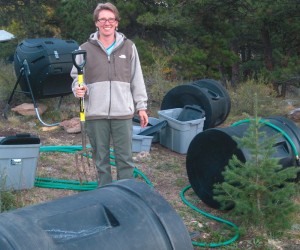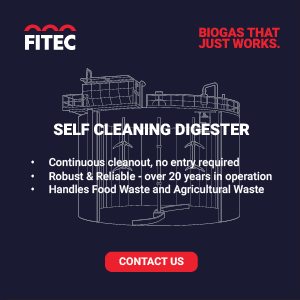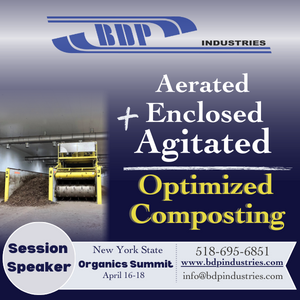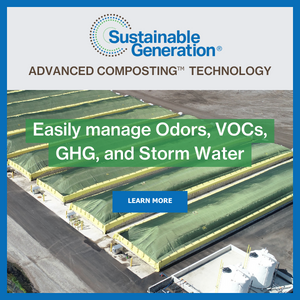BioCycle November 2012, Vol. 53, No. 11, p. 12
Seattle, Washington: Finalists Selected For Organics Processing Contract
Seattle Public Utilities (SPU) has selected two finalists — Lenz Enterprises in Stanwood, Washington and PacifiClean Environmental of Washington LLC, based in Spokane — in response to its Request for Proposals (RFP) for processing all or a portion of the yard trimmings, food scraps, food-soiled paper, approved compostable bags and approved compostable packaging collected by the city’s residential and commercial contract services as well as from other customers at city transfer stations. Both companies are in contract negotiations with SPU, with final contracts expected to be signed this coming winter, says Hans van Dusen with SPU. In 2011, about 90,000 tons of organic waste were collected and processed. The RFP was set up so that more than one contract could be awarded. Each finalist will be allocated a portion of the total organics stream. Currently, Cedar Grove Composting, with facilities in Maple Valley and Everett, Washington, is processing the source separated organics. The city of Seattle’s contract with Cedar Grove allows for processing services associated with the current contract to end either in March 2014 or March 2015, adds van Husen. “We haven’t decided which year we will end that contract,” he says. “So the new processing contracts would start in either April 2014 or April 2015.”
Finalist PacifiClean will collect organic material from Seattle’s transfer stations and haul it to an integrated organics processing facility being built in Elk Heights, Washington. The company is using the GORE Cover system for composting, and will install an anaerobic digestion system as part of its Phase 2 development in Elk Heights.
Nederland, Colorado: One Woman, Three Streams
A one-woman enterprise, Keep Magnolia Clean, is the only hauler in the mountains of Boulder County, Colorado that collects organics, recyclables and trash. Jane Curtis Gazit, whose background and education is in public health, started Keep Magnolia Clean (KMC) after learning about a waste composition study conducted by Boulder County in 2010. “The study found that about 42 percent or 92,000 tons, of the county’s waste stream is organics, which is by far the largest sector,” she says. Curtis Gazit surveyed residents in the mountainous area of unincorporated Boulder County in fall 2011 to gauge their interest in composting. “I learned that people were very interested in supporting a local business which primarily focused on composting and recycling,” she says. The business started in January 2012.
In addition to recyclables and trash, Curtis Gazit collects food and vegetable scraps, eggshells, coffee, tea bags and a small amount of shredded paper. “My customers are amazing,” she notes. “Every once in a while, I find a piece of plastic wrap in a commercial customer’s container, but for the most part it is really clean. I did quite a bit of education when I began and would email or call my customers about contaminants I found.”
Residential customers are supplied with three-gallon MaxAir hinged containers for their organic materials. KMC supplies commercial customers with two to four larger containers ranging from 10 to 25 gallons, and switches them out with clean containers. Most commercial customers have twice-a-week pickups. Curtis Gazit has no employees. She collects the organics, recyclables and trash in a 4×4 Nissan truck. As of October 2012, KMC had 26 residential and commercial customers.
Recyclables and trash are taken to the Boulder County Nederland Transfer Station and the organics are composted on her 10-acre property in several 90-gallon tumblers made by Compost Wizard. After running out of tumbler space in April 2012, she began taking extra organics to Eco-Cycle in Boulder, about 16 miles away. “One of the bigger Boulder County challenges is we do not yet have a county-wide composting facility that would allow us to achieve our goals set forth in the county’s Zero Waste Master Plan,” Curtis Gazit says. KMC’s only competition for organics is the nonprofit NedCompost. “Their service area is the town of Nederland,” she notes. “They use bicycles to collect five-gallon buckets of food scraps, as well as compostable cups, plates and utensils. The large hauler that is my competition for trash is One Way, but they do not collect organics for compost.” KMC’s collection area is currently about 60 square miles. On average, Curtis Gazit gives away 200 gallons of compost to her customers each week. “The free compost is incorporated into each customer’s monthly plan,” she says. “It is proportional to the amount of food scraps I collect from them.”
Athens, Georgia: Food Waste Collection Service
Two entrepreneurs in Athens have launched the city’s first food waste recycling business. Kristen Baskin and her husband Edward founded Let us Compost in August, and have developed a client base of 25 residential and 5 commercial accounts, with the goal of reaching 100 clients by year’s end. To help finance the new enterprise, Baskin started an online Kickstarter campaign to raise $12,500 by mid-November. The funds would be used to purchase 100 wheeled carts,
100 buckets and a truck. Let Us Compost (LUC) charges homes and businesses $15/month for weekly pick ups. Prices are lower for customers who prepay: $36 for 3 months, $60 for 6 months and $96 for a year. Clients are supplied with Orbis plastic carts (13 gallon-size for residential customers and 21 gallon for businesses). The Baskins make weekly pick ups using their own vehicle — a 1998 Mercury Mountaineer with a trailer.
Food waste is delivered to a composting site at David’s Dragonfly Farm in Nicholson, Georgia, about 12 miles from Athens. David’s Dragonfly is a 120-acre organic farm that grows flowers, perennial plants, fruits and vegetables. Baskin, a graduate student working toward a degree in Applied Community Change and Conservation at Future Generations Graduate School in West Virginia, got the idea to start LUC after a trip to India heightened her awareness of the world’s waste handling challenges. Other services provided by LUC include compost delivery ($10/5-gallon bucket), event pick up (offering collection for compostables, recyclables and trash if desired) and zero waste wedding consulting and food waste collection.
In 2010, the Athens-Clarke County Solid Waste Department established a waste reduction goal of 75 percent diversion by 2020, notes Raskin. If Athens-Clarke County added a food waste service to its recycling program, officials estimate that 70 percent by weight of household food scraps could be diverted from the landfill. “The Athens-Clarke County Solid Waste Department wholeheartedly supports backyard composting, but food waste pick ups are currently beyond its capacity,” she says.
Berkeley County, South Carolina: New Mixed Organics Composting Facility
McGill Environmental Systems of N.C. Inc. plans to open a 75,000 tons/year organics recycling facility in Berkeley County by the end of 2013. The fully enclosed compost manufacturing plant will be constructed on the site of Berkeley County Water and Sanitation Authority’s (BCWSA) current yard trimmings operation (county-owned land) and owned and operated by McGill. It will accept and process a wide variety of organic materials from municipal, commercial and industrial generators, including food waste, food processing residuals, soiled paper, yard trimmings and biosolids. Intended compost end uses include professional sports turf, landscaping and storm water/erosion control. The Berkeley County facility will bring McGill’s total number of composting sites to seven. The company expects to hire up to 25 people to staff the plant.
Hardwick, Vermont: Raising Funds For Compost Heat Recovery
The Highfields Center for Composting in Hardwick is developing a heat recovery system to be integrated into composting operations. Highfields is analyzing four system concepts to capture this heat. The first two are based on radiant heat capture underneath the center’s aerated static piles, producing an estimated 8,000 to 10,000 BTU/hour. The third system harnesses air blowers used to introduce fresh oxygen into the pile. The fresh oxygen pushes hot air upwards, over a hydronic heat exchanger. The heat can be transferred to water or through an air-to-air heat exchanger. The fourth system builds on the work of Jean Pain, a French inventor known for his work in compost heat recovery. It uses radiant coils attached to wire utility panels connected in series and stacked within the compost pile. Using a high carbon compost blend, heat can be sustained throughout the winter.
Highfields Center launched a Kickstarter campaign to help raise the last of the funds necessary to build its heat recovery system. It intends to release its design and engineering plans as open source documents, so anyone can build their own. As of early November, Highfields had raised more than half the $40,000 in funds it needs. To donate, visit www.highfieldscomposting.org.
Highfields also has provided technical support to an integrated “Green Machine” project that recently started operating at Jasper Hill Farm in Greensboro, Vermont, a dairy farm with 45 milking cows that produces cheeses. Manure is mechanically separated between liquids and solids, with the solids composted in an aerated static system. Waste heat from the compost pile is captured through a heat recovery system, which will generate an estimated 350 million BTUs in the form of hot water, and another 165 million BTUs in the form of hot air per year. Whey from the cheese house will be blended with manure liquids and anaerobically digested. The digester will be warmed with heat recovered from the compost piles through a heat exchange system. Biogas will be used to heat wash water for the cheese house. Used wash water, along with processed digestate fluids, is filtered through an Advanced Botanical System, designed by EcoSolutions, in a greenhouse for wastewater treatment. The treated water will be used to irrigate pastures and an orchard. The greenhouse will also be heated with heat captured from the compost pile as well as passive solar heating. Compost will be used to amend the soils in the pastures and orchard.
Palo Alto, California: Stanford University Composting
Gradually expanding a food waste collection and recycling program it began in dining halls in 2003, Stanford University in northern California is now diverting about 216,000 lbs/month (1,300 tons/year) of food waste. The measured pace to the roll-out to cover more of the campus has been valuable in “selling” the program to students, staff and faculty, and making necessary adjustments along the way, according to Julie Muir, community relations manager for Peninsula Sanitary Service, Inc. (PSSI) and the Stanford Recycling Center. (PSSI is a privately owned recycling and solid waste company that services Stanford University.) “It has been a good way to test out various practices, find out what works, and build up evidence that the program is working and does not mean a lot of extra work for anybody,” Muir says.
Collection started in 2003 at one residential dining hall and has now expanded to all dining halls, larger restaurants/cafes, special events, graduate housing and some academic buildings. Pre and postconsumer food waste is collected. In late 2011, Stanford conducted a pilot office composting program in nine buildings on-campus. Offices put food and compostable material in 16 gallon containers lined with compostable bags. PSSI hauls the food waste to Newby Island Compost Facility in San Jose, for composting. Compost is delivered to area farmers, and also used on campus and in community gardens on the Stanford campus. In 2011, Stanford placed 14th among 126 college and universities competing in the food waste category in the annual RecycleMania competition, sponsored by the College and University Recycling Council. Stanford recycled 14.77 lbs/person of material during the 10-week period measured as part of the competition, Muir notes.











